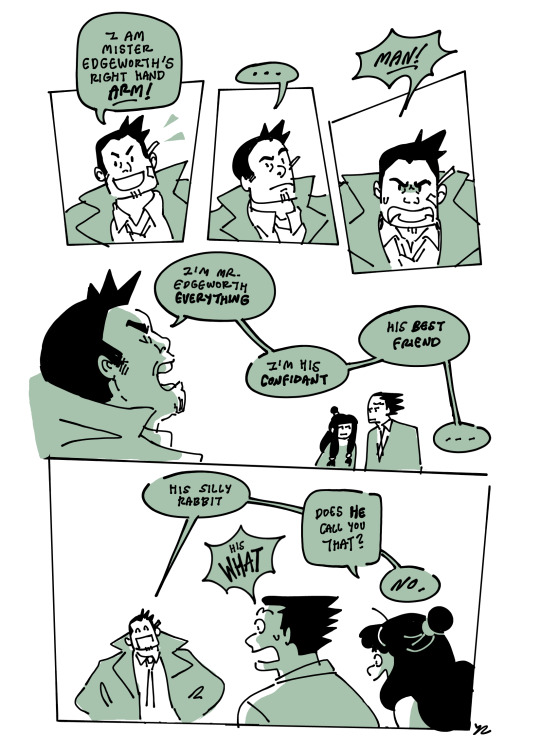zero/ling/零, he/they. brainrot compendium: persona 5 royal, csm, cql/mdzs, tgcf, beyond evil (ao3: farfromthemaddingcrowd)
Don't wanna be here? Send us removal request.
Text
no MY culture is best known for its culinary tradition and preferred alcohol
21K notes
·
View notes
Text
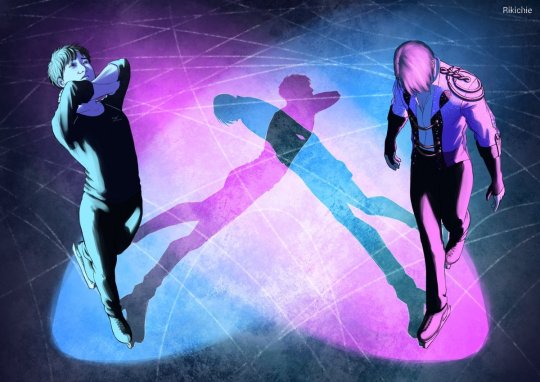

The beginning and the ending.
This story is already full of everything I need.
9K notes
·
View notes
Text
vampire who’s married to an archaeologist voice: my love, stop trying to carbon date me
145K notes
·
View notes
Text
I love characters with tunnel vision. False dichotomies. The sunk cost fallacy. Characters who are convinced of their utmost rationality and can even lay out their entire philosophy in logical, impersonal terms and convince others even though the whole of their actions, rationalised to hell and back though they may be, are spurred on by something entirely emotional (and this doesn't stop them from being right on the money about some things). Characters who are at once the most and least self-aware people ever. Characters who know the ins and outs of their psyche like a map they've memorised but can barely tell when they're experiencing a feeling.
5K notes
·
View notes
Note
do u have any reccs for cdramas? (:
I'm more of a movie watcher than a drama watcher so to be real, the full list of cdramas I've watched completely (remember watching + watched every episode of the show) numbers very few, and I also don't remember what happened in a lot of them:
Wu Xin: The Monster Killer (season 1 only) 无心法师
Secret of Three Kingdoms 三国机密
The Sleuth of Ming Dynasty 成化十四年
My Youth in Yan'an 我的青春���延安
Golden Female Bodyguard 黄金女保镖
Rise of Phoenixes 凰权·弈天下
Qin Dynasty Epic 大秦赋
Double Tap 双探
The Knockout/Punch Out 狂飙
[mid 2010s anachronistic comedy transmigration drama can't remember the title of whatsoever but i livetweeted the whole thing when i had twitter for a year]
Some of these shows are trash tho
132 notes
·
View notes
Text
I still think about during my last semester of undergrad I took comparative religion as an elective and this was during covid and a bad wildfire season so everybody around me was losing their jobs, homes, health. And one day during Zoom class someone explained the word “yeet” to my comparative religion professor as the opposite of yoink
And without any hesitation she said “Ah, so the lord yeetith and the lord yoinkith away”
And when I tell you that kept me going for at least a week
8K notes
·
View notes
Text
knitting tutorial made by a twenty-something knitting influencer: 18 min long, 12 of those minutes being the intro and a sponsor plug, they show the first few steps of the tutorial at the slowest speed known to man, they show the most important steps at a neck-break speed, they stop every five seconds to talk about what they just did, 40,000 comments filled with questions ranging from insightful to “how do i knit”, filmed with a camera that costs more than a car, the tutorial is incorrect.
knitting tutorial made by a seventy-something grandmother: two min long, filmed 17 years ago, shows you what you want with the skilled patient hands of a beloved deity, made with the world’s shittiest camera, the best video on the fucking internet, four comments and 30 views, you lose the video and never find it again.
87K notes
·
View notes
Text
ON GHOSTS AND DEMONS: Wei Wuxian's "demonic" cultivation?
There are a few big misconceptions I have repeatedly seen in English-speaking fandom about things that are fundamental to the story of MDZS. One of them is this—
Wei Wuxian is not a demonic cultivator.
To prove this, let's take a deep dive into the original Chinese text of MDZS.
(Adapted from my original gdoc posted on Twitter on May 27, 2022. All translations my own unless otherwise stated.)
Demon vs. ghost
Let's start from the very basics. In addition to orthodox cultivation using spiritual energy and a golden core, there are two other forms of cultivation that are mentioned in the novel:
魔道 (mó dào), or “demon cultivation/path.”
鬼道 (guǐ dào), or “ghost cultivation/path.”
To be clear, 魔 mo "demons" and 鬼 gui "ghosts" (and thus their respective cultivation/paths) are not interchangeable because of the in-universe worldbuilding within MDZS. Using the characters in the term 妖魔鬼怪 "monsters," MXTX created four distinct categories of beings, each of which has a strict definition in the novel. From chapter 4 (jjwxc ch 13):
妖者非人之活物所化; 魔者生人所化; 鬼者死者所化; 怪者非人之死物所化。 Yāo (妖) are transformed from non-human living beings; mó (魔) are transformed from living people; guǐ (鬼) are transformed from the deceased; guài (怪) are transformed from non-human dead beings.
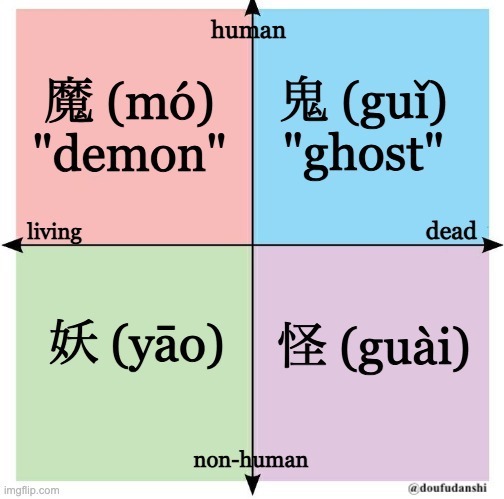
And of course, WWX hoards all the ghost-type pokemon monsters at the Phoenix Mountain tournament, and he only exerts control over corpses, spirits, and the like (aka people who have already died). (As opposed to Xue Yang, who appears to have been actively trying to make 魔 "demons" out of living people with those "living corpses" of his, perhaps.) (And, ironically, in order to avoid showing necromancy / zombies on screen, CQL technically does show WWX practicing demon cultivation because everyone is "supposedly alive" even when they're corpses? Which is, funnily enough, far worse morally in the MDZS universe, lol.)
So, intuitively at least, we know that WWX must be practicing ghost cultivation—now let's look at some concrete examples from the book.
Running the numbers
1) 魔道 (mó dào) means “demon cultivation.” As such, it must use living humans.
魔道 appears one (1) time in the novel.
Yes, once. The only time it appears is in the term 魔道祖师 modao zushi, or the namesake of the novel, in chapter 2. This is a title the general public has given him through rumors:
魏无羡好歹也被人叫了这么多年无上邪尊啦、魔道祖师啦之类的称号,这种一看就知道不是什么好东西的阵法,他自然了如指掌。 Wei Wuxian wasn’t called titles like “The Evil Overlord,” “The Founder of Demon Cultivation,” and so on over the years by others for nothing—he knew these sorts of obviously shady formations like the back of his hand.
2) 鬼道 (guǐ dào) means “ghost cultivation.” As such, it must use dead humans.
鬼道 appears 12 times in the novel.
Here is the first instance that 鬼道 appears, which I believe is the first time Wei Wuxian's method of cultivation is properly introduced. From chapter 3 (jjwxc ch 8):
蓝忘机 […] 对魏无羡修鬼道一事极不认可。 Lan Wangji […] had never approved of the fact that Wei Wuxian practiced ghost cultivation.

Here's another quote from chapter 15 (jjwxc ch 71) for funsies:
蓝忘机看着他,似乎一眼就看出他只是随口敷衍,吸了一口气,道:“魏婴。” Lan Wangji looked at him as if he saw through his half-hearted bluff. He took in a breath, then said, “Wei Ying.” 他执拗地道:“鬼道损身,损心性。” He stubbornly continued, “Ghost cultivation harms one’s body, and harms one’s nature.”
3) 邪魔歪道 (xiemowaidao) means heretical path/immoral methods/evil practices/underhanded means/etc—e.g., lying, cheating, stealing, bribery, and so on.
It appears ~24 times in the novel.
I mention this last term because it is often used to refer to Wei Wuxian's cultivation, but as a pejorative. Every instance of 邪魔歪道 is said by or to quote someone looking down upon Wei Wuxian’s cultivation (Jin Zixun, Jin Ling, etc.) and referring to it derogatorily, whereas every instance of 鬼道 guidao/ghost dao is said by someone discussing it neutrally and/or factually (Lan Jingyi, Lan Wangji, Wei Wuxian himself, random cultivators at discussion conferences, the narration, etc.). Here is a pertinent example with Jin Ling (derogatory) and Lan Jingyi (neutral) in chapter 9 (jjwxc ch 43):
金凌怒道:“是在谈论薛洋,我说的不对吗?薛洋干了什么?他是个禽兽不如的人渣,魏婴比���更让人恶心!什么叫‘不能一概而论’?这种邪魔歪道留在世上就是祸害,就是该统统都杀光,死光,灭绝!” “We are discussing Xue Yang,” Jin Ling said angrily. “Am I wrong? What did Xue Yang do? He’s scum that’s lower than a beast, and Wei Ying is even more disgusting than him! What do you mean ‘don’t make sweeping generalizations?’ As long as those practicing this kind of demonic, heretical path are alive, they’ll continue to bring disaster. We should slaughter all of them, kill all of them, annihilate them once and for all!” 温宁动了动,魏无羡摆手示意他静止。只听蓝景仪也加入了,嚷道:“你发这么大火干什么?思追又没说魏无羡不该杀,他只是说修鬼道的也不一定全都是薛洋这种人,你有必要乱摔东西吗?那个我还没吃呢……” Wen Ning shuffled around. Wei Wuxian gestured at him to stay still, only to hear Lan Jingyi also join the fray, bellowing, “Why are you getting so riled up? It’s not like Sizhui said Wei Wuxian shouldn’t have been killed. All he said was that people who practice ghost cultivation aren’t necessarily all like Xue Yang. Do you have to go around breaking things? I didn’t even get to eat any of that yet…”
Tl;dr—Wei Wuxian does not 修魔道 practice demon cultivation. When Wei Wuxian’s craft is discussed in a neutral and factual manner, it is referred to as 鬼道 ghost dao.
In fact, Wei Wuxian’s imitators are also referred to explicitly as 鬼道修士 ghost cultivators.
魏无羡早就听说过,这些年来江澄到处抓疑似夺舍重生的鬼道修士,把这些人通通押回莲花坞严刑拷打。 Wei Wuxian had heard a while back that over the past few years, Jiang Cheng had gone around snatching any ghost cultivator suspected of being possessed or reborn, detaining them in Lotus Pier to interrogate them using torture.
So why the confusion?
Of course, there is the matter of the novel's title, which I will get into in a second. But the real issue is a matter of translation.
The idea that WWX uses "demonic cultivation" is a misconception in English-speaking fandom due to issues with the translation of terminology. Of note, EXR actually did translate 鬼道 guidao as "ghostly path" most of the time, though there were at least 3 instances of "demonic" and 1 instance of "dark," especially regarding the first few.
However, this misconception was perpetuated (and arguably worsened) by 7S's official translation, which not only mistranslated additional terms as "demonic cultivation/path" (at least in book 1), but also consistently mistranslated every instance of 鬼道 as "demonic cultivation/path."
So why is this book called 魔道祖师, commonly translated as "Grandmaster of Demonic Cultivation?"
One possibility is one posed in Chinese-language meta online, which often cites that WWX himself is a sort of 魔 demon. While this may be true—after all, he can hear the voices of the dead—it doesn't quite explain the fact that the title sets him up to be the 祖师 or "founder."
My take is that this novel is very much concerned with hearsay vs. truth. This is one of the many monikers WWX is given by the public, who collectively view him as evil. (Also of note is that the non-cultivator public is not aware of all the nuances that cultivators learn re: distinctions between the 妖魔鬼怪 monsters.) In the quote from earlier, note that the first title we're given is actually 无上邪尊 “The Evil Overlord,” then 魔道祖师 "The Founder of Demon Cultivation." Like, what can that be other than MXTX telling us, "please take both of these with a HUGE grain of salt, lol."
(And not only the title, but the very first line—"魏无羡死了。" / "Wei Wuxian is dead."—is a lie.)
I think the title is genius, honestly. It intentionally makes readers come into the novel with preconceived notions that Wei Wuxian practices 魔道 demon cultivation and evil techniques—just like the public in the story. What better way to tell a story warning about the dangers of how easy it is to fall for misinformation and jump to incorrect conclusions?
(Though, in our case, perhaps it worked a little too well.)
1K notes
·
View notes
Text
what makes it special






…. rogo acheki finally embraces the gay panic ….
… and here are the fav frames as always
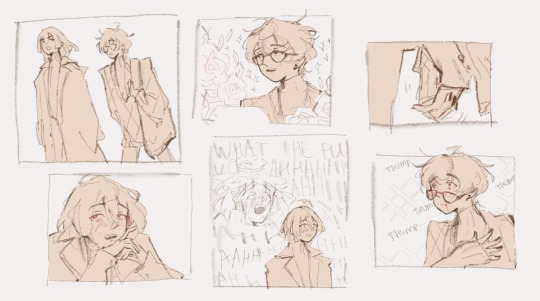
6K notes
·
View notes
Text
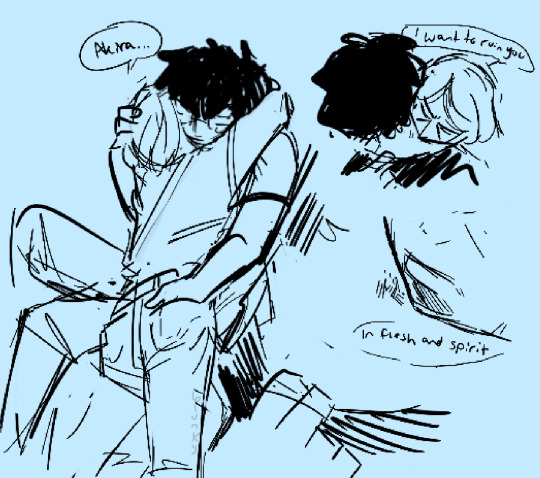
heterosexual things to say before he bites him
505 notes
·
View notes
Text
In light of Duolingo laying off its translators, here are my favourite language apps (primarily for Mandarin Chinese, Japanese, and te reo Māori).
Multiple Languages
Anki is a flashcard programme and app that's not exclusively for languages. While making your own decks is ideal, you can also download shared decks for most languages.
If you're learning Japanese, specifically, Seth Clydesdale has websites for practicing alongside Genki's 2nd or 3rd editions, and he also provides his own shared Anki decks for Genki.
And if you're learning te reo Māori, specifically, here's a guide on how to make your own deck.
TOFU Learn is an app for learning vocabulary that's very similar to Anki. However, it has particularly excellent shared decks for East Asian languages. I've used it extensively for practicing 汉字. Additionally, if you're learning te reo Māori, there's a shared deck of vocabulary from Māori Made Easy!
Mandarin Chinese
Hello Chinese is a fantastic app for people at the HSK 1-4 levels. While there's a paid version, the only thing paying unlocks is access to podcast lessons, which imo are not really necessary. Without paying you still have access to all the gamified lessons which are laid out much like Duolingo's lessons. However, unlike Duolingo, Hello Chinese actually teaches grammar directly, properly teaches 汉字, and includes native audio practice.
Japanese
Renshuu is a website and app for learning and practicing Japanese. The vast majority of its content is available for free. There's also a Discord community where you can practice alongside others.
Kanji Dojo is a free and open source app for learning and practicing the stroke order of kanji. You can learn progressively by JLPT level or by Japanese grades. There's also the option to learn and practice kana stroke order as well.
10K notes
·
View notes
Text
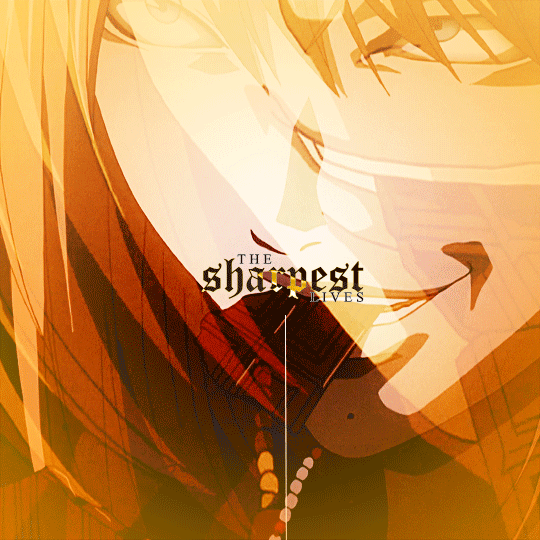
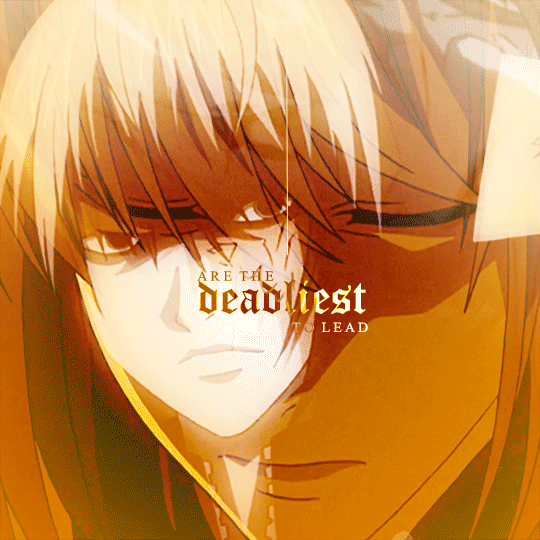
A light to burn all the empires So bright the sun is ashamed to rise and be
145 notes
·
View notes
Text

brush test that im not coloring because i like not having wrist pain
1K notes
·
View notes
